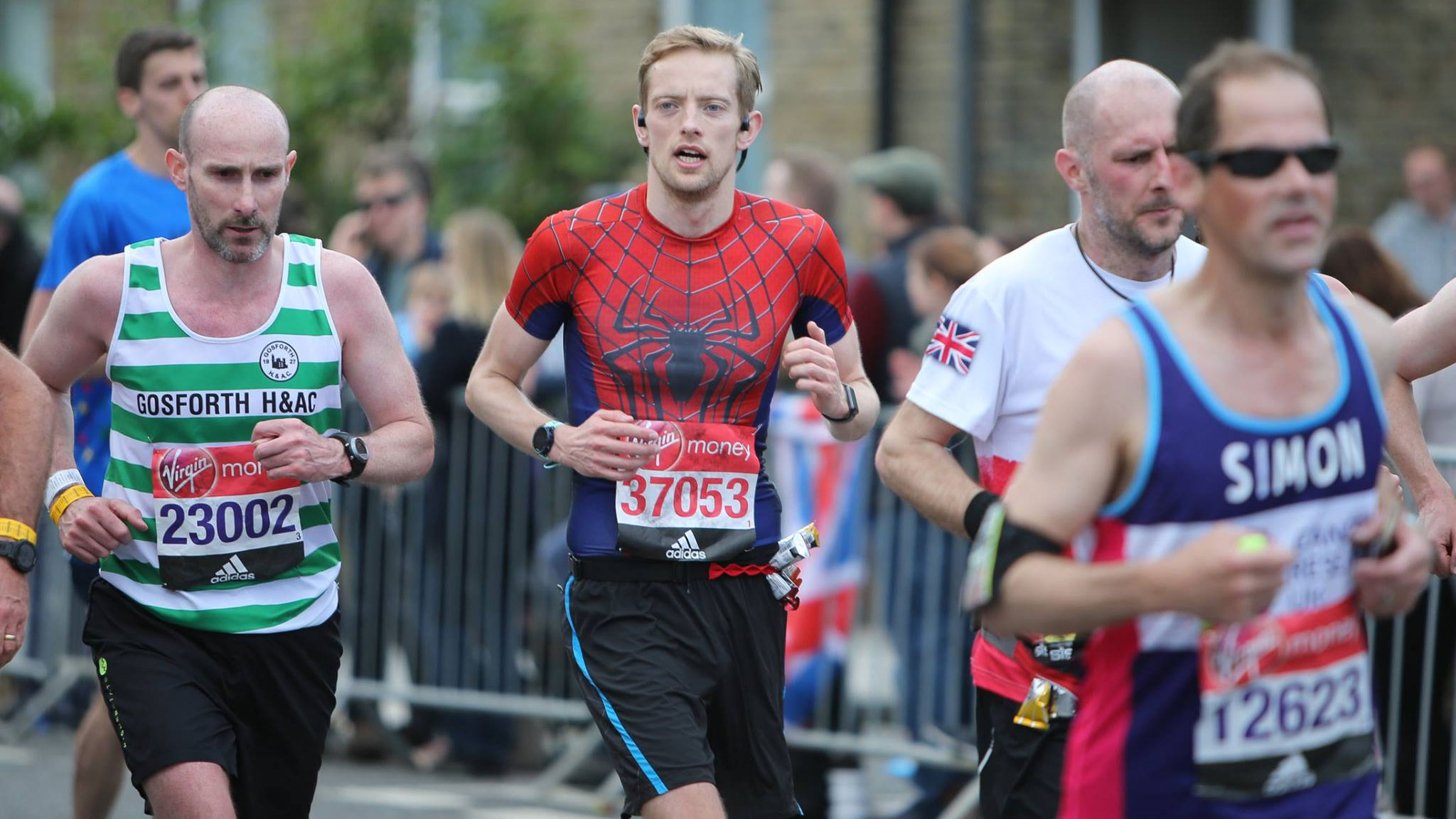London Marathon 2018: why tech can be your secret weapon this year
Day 1: Everything you need to know about tech and running

It’s happening again. Oh lordy, it’s happening again. The London Marathon. Why am I doing this? Seriously, why? It’s so far! I’ll be on my feet for so long! I’ll be so tired and I might be sick!
It’s hard to answer those points, but I do why I'm doing this wretched thing again: the siren of the marathon won’t leave many runners, and I’ve been caught in the loop for two years now.
There’s no point remembering the low moments, the difficult training, the sacrifices I’m making again. I’m hell-bent on solving the marathon puzzle, getting the time that I think I should be hitting.

When is the London Marathon 2018? It's on the date tattooed into the dreams of its runners: 22 April.
What are the London Marathon start times? The Elite Wheelchair Races begin at 08:55, the World Para Athletics Marathon World Cup ambulant races at 09:00, the Elite Women's race at 09:15, and the the Elite Men's Race, British Athletics & England Athletics Marathon Championships and Mass Race at 10:00.
What's the London Marathon route? It's all around the centre of the UK's fine capital. Have a look at it here on the official website.
Where can I find the London marathon results? I mean, you've probably guessed it's all on the official site by now, but if you want a quick link to the results after the race has finished (or to check out past results) it's right here.
How do I watch the London Marathon? We've got all the answers no matter where you live in our London Marathon live stream guide
Photo by Jens Moser on Unsplash
Reading my race report from last year, the memory of the finish comes screaming back. A terribly muted finish in front of grandstands of people not really making much of a noise. The end is rather unedifying at the London Marathon.
Then I remember not being able to breathe properly, wondering if I should go into the medical tent, but realising that I’ve just run a really long way and I’m probably a bit tired.
It took a while (and involved sitting quietly on some hotel steps), but eventually I began to recover. In that time I began to think back to the race, how I’d not achieved the time I’d wanted, but also how I’d really begun to struggle in the final six miles and promised myself to respect the fact I didn’t stop and walk at any point, holding on that little bit longer time, and time, and time again.
But it strengthened my resolve to come back and tame the London Marathon, to make it something I felt confident in and could conquer. I didn’t want it left as a blemish on my record, even if I did do better in another race (I haven’t, by the way).
Get daily insight, inspiration and deals in your inbox
Sign up for breaking news, reviews, opinion, top tech deals, and more.
So here I am, readying another diary to march me towards another start line. I thought I knew what I did wrong last year: I tried to do too much at once, heading to the gym while running and eating really well and not touching alcohol.
It was a good idea, but during my training I watched as my 10K and half marathon times rose, trying to do too much training and nothing was improving.
The marathon was, predictably, something of a failure compared to my target - and I knew I had to try again to figure out the puzzle.
Here’s where the story got strange though: in the following weeks and months, with my training intensity dipping hard due to a lack of motivation and personal events… I began to get faster.
My 5K, 10K and (nearly) half marathon times all began to shoot back down - I was flying up my club’s rankings and this was on ‘poor’ training and definitely poor eating. I could only surmise two things: I worked well when I allowed myself to rest, and the strength / cardio overload had started some momentum that took a while to come through, like a flywheel taking time to get up to speed.
That continued right through the year, and I resolved to do something with it: spend some time getting strong in the gym, with minimal running, then switch the two over at Christmas and begin marathon levels of running per week.
It seemed like a genius plan, and it seemed to work. I was feeling really strong come the yuletide period, my race times hadn’t depleted too badly despite running less and I was ready to start. Also, I was eating all the cake I could because I wasn’t going to go through that again.
Last year I posed the question: 'Is the key to running a fast marathon actually biscuits?' and I'm very much going to find out of that's the case. Last year I ate sweet potato and cous cous, getting down to a decent racing weight, but was so thin one YouTube commenter kindly asked the question: 'Why are you letting crack addicts review your phones?'.
I would have been offended but I was rather skinny, but my Mum (and, for some reason, a few of her friends) were hugely vocal in telling me that I didn't look healthy. 'But I'm training for a marathon!' I pleaded, despite knowing I looked like a human lollipop.
This year I celebrated a 22-mile run with two full-fat roast dinners and a Twix.
An unfortunate hiccup
Actually, there's something that's going to ruin this hugely scientific experiment: I managed to get my first injury in the build up. I've been very lucky to get this far in my running career without hurting myself more, to be honest, but a spot of achilles tendinopathy flared up after a routine 18-mile run.
No reason, and the physiotherapist (what, you think I knew the word 'tendinopathy' already?) said that it was just an inflammation and some exercises would help me sort it.
Did the exercises help? Not initially, but eventually they cleared it right up. Well, they might have done so sooner had I actually done them - but heel drops hurt, and I thought I was doing more damage.
Turns out that I'm an idiot and rehab recommendations are there for a reason... instead I ran through the issue for a few weeks, missing vital long runs and getting lucky that I didn't do more damage.

Anyway, that's enough of me moaning. Let's talk about the diary in hand, my Running Man of Tech London Marathon countdown for the second year.
This year I'm going to explore a few different topics regarding technology and running. I'll see what tech secrets the sub-three hour marathon runners can share. I'll let you in on a new app that promises it can pace a marathon for you.
I'll suss out what tech you can find at the London Marathon Expo, and most importantly I'll bring you the full race report the day after the Marathon.
I would do it on the day, but I'll probably be too tired to roll over, let over bring you a witty, endearing and emotionally-connection report.
I know that I'm not going to hit a good time this year, relative to the marathons I've done before. I have to find a way to not let that disappoint me, to appreciate the event and not get hung up on PB times.
Will technology hold the answer to saving my race? Here's hoping...
If you've got any tech questions ahead of the big day - or just about running in general - feel free to get in touch using the links below, or email me directly! It'd be great to answer some direct questions from runners over the next few days.
- Gareth Beavis is TechRadar's Running Man of Tech, bringing you a daily diary as he counts down to the big race at the London Marathon. He gained a place in the media ballot, but has paid full price for his entry.

- If you want to say hi, he's @superbeav on Twitter
- You can see his stumblings on Strava
- And for more data, follow him on Smashrun
- And if you want to get the full lowdown on the latest and greatest running tech, read the rest of the Running Man of Tech story here

Gareth has been part of the consumer technology world in a career spanning three decades. He started life as a staff writer on the fledgling TechRadar, and has grew with the site (primarily as phones, tablets and wearables editor) until becoming Global Editor in Chief in 2018. Gareth has written over 4,000 articles for TechRadar, has contributed expert insight to a number of other publications, chaired panels on zeitgeist technologies, presented at the Gadget Show Live as well as representing the brand on TV and radio for multiple channels including Sky, BBC, ITV and Al-Jazeera. Passionate about fitness, he can bore anyone rigid about stress management, sleep tracking, heart rate variance as well as bemoaning something about the latest iPhone, Galaxy or OLED TV.